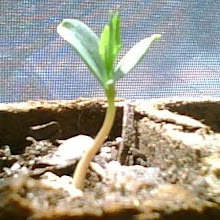In May 2009, Ghent was reported to be "the first [city] in the world to go vegetarian at least once a week" for environmental reasons, when local authorities decided to implement a "weekly meatless day". Civil servants would eat vegetarian meals one day per week, in recognition of the United Nations' report. Posters were put up by local authorities to encourage the population to take part on vegetarian days, and "veggie street maps" were printed to highlight vegetarian restaurants. In September 2009, schools in Ghent are due to have a weekly veggiedag ("vegetarian day") too.
It's just one city in a world of cities. But the decision is huge.
First things first -- your meat was once an animal. It ate a lot of food and drank a lot of water. The food it ate (probably some sort of grain) was grown somewhere. The food needed lots of water to grow.
From Time.com:
To produce 1 lb. of feedlot beef requires 7 lbs. of feed grain, which takes 7,000 lbs. of water to grow. Pass up one hamburger, and you'll save as much water as you save by taking 40 showers with a low-flow nozzle.
So, going vegetarian reduces water consumption. And note -- that's not "all hamburgers for the rest of your life." Just ONE hamburger = 40 showers (provided you're using a low-flow nozzle, probably about 5 gal/min).
Now, your pre-meat animal also contributed a lot of greenhouse gases. (Air pollution.) In 2006, the UN released these facts and info; meat production was found to have contributed 9% of the world's carbon dioxide emissions; 35-40% of the world's methane; 65% of the world's nitrous oxide; and 64% of the world's ammonia.
(And just FYI: In terms of Global Warming Potential (GWP): methane is about 21 times worse than carbon dioxide. Nitrous oxide is 296 times worse than carbon dioxide.)
So, Going vegetarian reduces greenhouse gas emissions. And even if you don't believe in global warming, you should know that the World Health Organization estimates about 2 million premature deaths can be blamed on air pollution.
Finally, your pre-meat animal, as we said, ate a lot of grain. Did you know that people can eat grain just like animals can? Did you know that in the US, in 1999, 70% of all corn and grain produced went into the bellies of our pre-meat animals? Did you know that, according to Cornell ecology professor David Pimentel, "If all the grain currently fed to livestock in the United States were consumed directly by people, the number of people who could be fed would be nearly 800 million"?
So: Going vegetarian increases the amount of total food in the world. Seriously... 800 million people?
I'm sorry if writing all this down makes meat-eating seem a bit... selfish. (But on the other hand, maybe it is and maybe a little guilt won't hurt you any.)
I should note that I, myself, am not completely vegetarian. I limit my consumption, but unfortunately I sort of forgot what I set as my limit. Originally it was supposed to be that I could eat meat two days a week, keep them lower on the food chain (poultry or fish). Red meat could be consumed about once a month. Honestly, I've slipped a little -- but reading facts like this is a wake-up call to myself about the reality of what I'm eating.
Anyway, take a note from Ghent, Belgium. Are you eating meat all week? Think you could go veg just one day? I believe that you can. Are you eating just a bit? Think you can cut back more? I believe that you can. Try it and see.

No comments:
Post a Comment